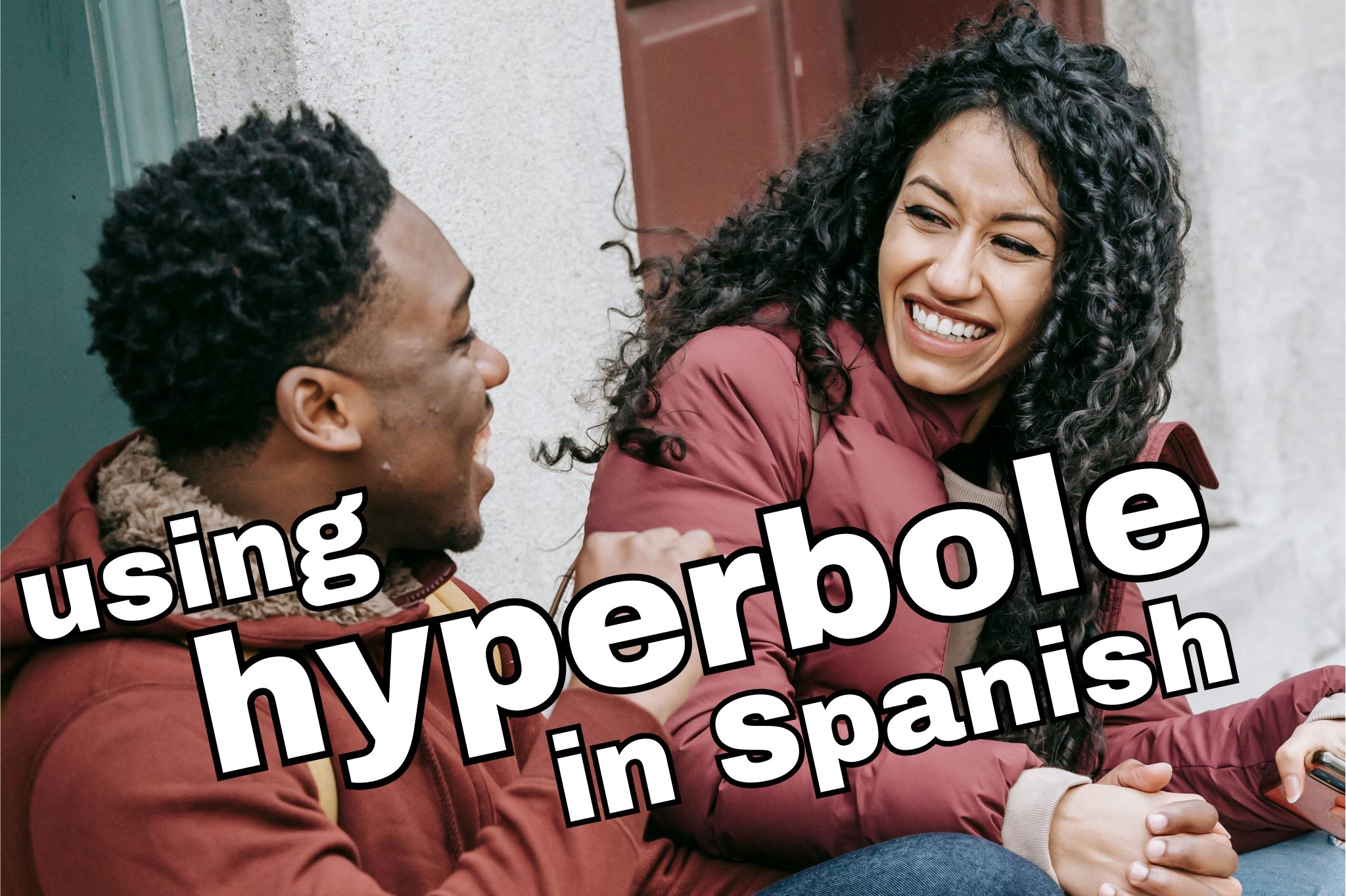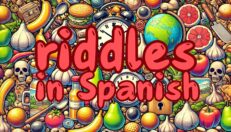Spanish Hyperboles: The biggest exaggerations of all time!

Get our free email course, Shortcut to Conversational.
Have conversations faster, understand people when they speak fast, and other tested tips to learn faster.
More infoAre you ready to have your mind blown?
Ok, so that’s obviously a total exaggeration, but you get the point, right? This is hyperbole, and it’s super popular in Spanish.
Today’s post is all about how to use hyperbole in Spanish. First off, we’ll start by defining what it is. Then we’ll spend some time considering when it’s a good call to use hyperbole in Spanish, and when it’s better to keep things literal. We’ll round out our intro by giving some pointers on how to pick up some Spanish hyperboles of your own.
Once our explanations are out of the way, we’ll get to the fun stuff. Get ready for a list of Spanish hyperboles that are the biggest exaggerations of all time!
What is hyperbole?
Hyperbole is intentional over-exaggeration to make a point, but which is not intended to be taken literally.
Hyperbole in general describes the figure of speech, while a hyperbole is an instance of such an over-exaggerated expression.
You’ve surely used hyperbole in English, and perhaps even in other languages. So why not use a bit of hyperbole in Spanish?
Hyperbole is definitely widespread across the Spanish-speaking world, to the point that many speakers probably don’t even recognize that they’re over-exaggerating. But still, there are some important nuances to keep in mind when using it, so let’s take a look at when and how to incorporate hyperbole into your Spanish.
Use hyperboles all the time
Being expressive is the spice of language, especially in Spanish, where exaggeration is often embraced to add humor, drama, or emphasis. You can use hyperboles in nearly every conversation to make your speech more engaging and memorable.
Instead of saying tengo mucha hambre (I’m very hungry), for example, you might say, ¡Tengo tanta hambre que podría comer un elefante! (I’m so hungry I could eat an elephant!). While clearly an exaggeration, it conveys your point in a fun, expressive way.
Don’t be afraid to go big! The more playful your hyperboles, the more your Spanish will stand out.
Adjust the use of hyperboles to your audience
While hyperboles can be delightful, it’s important to consider your context. Sometimes it’s best to just keep things literal in certain company. Don’t overdo it with law enforcement, government agents, or a new boss, for instance. It may be funny to tell your friend that he’s más lento que una tortuga dormida (slower than a sleeping turtle), but this probably won’t help your case if you say it to the customs agents taking their sweet time to search your things at the border!
In situations that are even somewhat formal, like at work or with people you’ve just met, over-exaggeration could seem unprofessional or overly dramatic. Hyperbole isn’t meant to be taken seriously, so keep your hyperboles light and appropriate.
As with anything, choose your words wisely so you don’t end up insulting anybody by mistake.
Adapt your hyperboles to the local culture
Expressions of hyperbole often vary between Spanish-speaking regions, so listening to locals can help you pick up on exaggerations that are unique to their cultural realities.
If a Mexican finds something to be delicious, for instance, they’d say that está más sabroso que un taco al pastor callejero (it’s tastier than a street-style al pastor taco). And if they’re really tired, a good Mexican hyperbole is that estoy más cansado que un burro en la feria (I’m more tired than a donkey at the fair). These exact same hyperboles in Spain may not make much sense, since they really reflect the local humor and context where you learned them.
By adapting the expressions you hear around you, your Spanish will feel more authentic and connected to the culture. The use of such regional hyperboles in Spanish is a great way to endear yourself to the locals!
Catch hyperboles in media and make them your own
Hyperboles are everywhere in Spanish-language media, from dramatic soap operas to lively podcasts. Pop culture media is a treasure trove of colorful expressions! Pay attention to how characters or hosts use phrases like ¡eso es lo mejor que he visto en mi vida! (that’s the best thing I’ve ever seen in my life!), and try using them yourself.
Whether from a popular series or a catchy song lyric, the exaggerated phrases you pick up in the media may even help you to be more relatable to your Spanish-speaking peers. If you’re talking about a breakup and say that este pecho es antibalas (this chest is bulletproof), for example, it’s likely that your friends will catch the Selena Gomez reference and support your strength in moving on.
Spanish hyperboles
Now that you know the basics for picking up and using hyperboles in Spanish, it’s time to dive in and see a bunch of examples! It’s ok if you don’t take our title literally that these are the biggest exaggerations of all time, since you now know that they’re all just fun ways to make a point with humor.
Why not start with this video where Mafalda gives a quick overview of hyperboles and introduces a few easy ones. Then read on for the world’s best list of hyperboles in Spanish!
- Te llamé mil veces. – I called you a thousand times.
- Tengo un millón de cosas que hacer. – I have a million things to do.
- Estoy muerto de cansancio. – I’m dead from fatigue.
- Estoy tan cansado que podría dormir un año. – I’m so tired I could sleep for a year.
- Eres más lento que una tortuga. – You’re slower than a turtle.
- Esta bolsa pesa una tonelada. – This bag weighs a ton.
- Esta casa es un palacio. – This house is a palace.
- La luz del sol es tan fuerte que me está quemando los ojos. – The sunlight is so strong it’s burning my eyes.
- Hace tanto calor que podrías freír un huevo en la acera. – It’s so hot you could fry an egg on the sidewalk.
- Hace un calor que derrite las piedras. – It’s so hot it could melt stones.
- Hace un calor infernal. – It’s as hot as Hell!
- Estoy congelado. – I’m frozen solid.
- Este cuarto está tan frío que parece un congelador. – This room is so cold it feels like a freezer.
- Hace un frío que congela hasta el alma. – It’s so cold it freezes you to your soul.
- Llueve tanto que parece que el cielo se está cayendo. – It’s raining so much it feels like the sky is falling.
- Llueve a cántaros. – It’s raining buckets.
- Hace tanto viento que podría volar una casa. – It’s so windy it could blow away a house.
- Este coche va tan rápido que parece un cohete. – This car goes so fast it feels like a rocket.
- Es tan rápido corriendo que parece un rayo. – He’s so fast running that he looks like lightning.
- El niño tiene una energía infinita. – The kid has infinite energy.
- Hizo tanto ruido que despertó a los muertos. – He made so much noise he woke the dead.
- La música está tan alta que podría romper los cristales. – The music is so loud it could break the windows.
- Corrí tan rápido que casi volé. – I ran so fast I almost flew.
- Es tan alto que toca el cielo. – He’s so tall he touches the sky.
- Es tan rica que nada en dinero. – She’s so rich she swims in money.
- Tiene tanta suerte que podría ganarse la lotería dos veces. – He’s so lucky he could win the lottery twice.
- Este pueblo es tan pequeño que todos somos primos. – This town is so small we’re all cousins.
- Hay tanto tráfico que parece que todo el mundo decidió salir al mismo tiempo. – There’s so much traffic it feels like everyone decided to go out at the same time.
- Esta película me hizo reír hasta morir. – This movie made me laugh to death.
- Esa película es tan aburrida que podría dormir una semana. – That movie is so boring I could sleep for a week.
- Tengo tanta sed que podría beberme el océano. – I’m so thirsty I could drink the ocean.
- ¡Es el mejor helado del mundo! – It’s the best ice cream in the world!
- Se comió una montaña de tacos. – He ate a mountain of tacos.
- Esta hamburguesa es tan grande que necesitaré tres días para terminarla. – This burger is so big I’ll need three days to finish it.
- Hay tanta comida que podríamos alimentar a un ejército. – There’s so much food we could feed an army.
- El examen fue tan fácil que podría haberlo hecho con los ojos cerrados. – The exam was so easy I could have done it with my eyes closed.
- Este examen es tan difícil que solo un genio podría aprobarlo. – This exam is so hard that only a genius could pass it.
- Habla tanto que nunca respira. – She talks so much she never breathes.
- Tiene tanta energía que parece que nunca se cansa. – She has so much energy she seems to never get tired.
- Está tan ocupado que ni siquiera tiene tiempo para respirar. – He’s so busy he doesn’t even have time to breathe.
- Es tan terco que podría discutir a una pared. – He’s so stubborn he could argue with a wall.
- Tuvo tanta paciencia que esperaría cien años sin quejarse. – He has so much patience that he could wait a hundred years without complaining.
- Tiene un corazón tan grande que no le cabe en el pecho. – He has such a big heart it doesn’t fit in his chest.
- Su sonrisa es tan brillante que ilumina toda la habitación. – Her smile is so bright it lights up the whole room.
- Lloré un río. – I cried a river.
Conclusion: Hyperbole in Spanish
Are you so overwhelmed you’re about to explode? What’s more likely is that you get the point, you’re clear on what hyperbole is, and you’ve now got a bunch of examples to draw on when you want to use it in your own spoken Spanish.
Maybe today’s post didn’t literally present the biggest exaggerations of all time, but hopefully we at least provided you with a fun distraction as you read through all these Spanish hyperboles!



